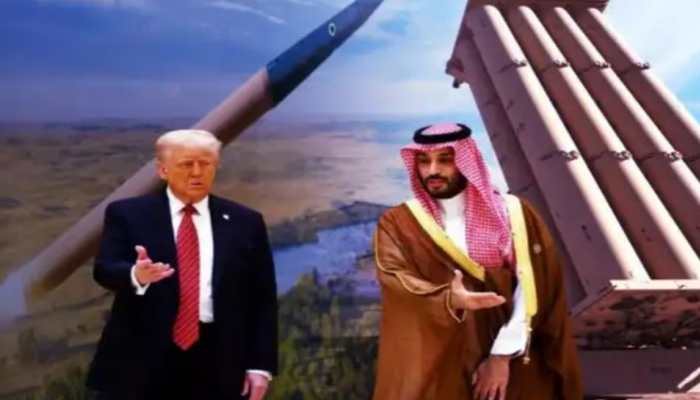Even After U.S. Plea, Saudi Refused Defense Aid To Israel; Prince Salman Rejected Trump’s Request Against Iran
During intense Iranian missile barrages, Israel’s interceptor missile stockpile, especially THAAD, Arrow and Patriot, was rapidly depleting. In desperation, the U.S. sought help from Saudi Arabia, but Riyadh promptly refused.
Trending Photos
)
Riyadh/Washington: A previously undisclosed standoff unfolded behind the scenes of the 12-day Iran-Israel war in June, as Saudi Arabia flatly refused a direct request from the United States to transfer its powerful American-made THAAD air defense systems to Israel, according to two senior U.S. defense officials cited by the Middle East Eye.
At the height of the conflict, Iran had unleashed waves of advanced ballistic missiles, and Israel’s stockpile of interceptor missiles, especially the high-altitude THAADs, was running dangerously low. Faced with the rapid depletion of its own interceptors like the Arrow and Patriot, the U.S. administration urgently reached out to Riyadh. But the response it got was immediate and firm.
According to one official familiar with the internal deliberations, “We were asking everyone to contribute. When that failed, we tried to negotiate. But this was not just about one country.”
American officials tried to convince Saudi Arabia that Tehran was not only a threat to Israel; it posed a looming danger to Saudi national security as well. But the Saudis did not budge.
Despite being fully capable of aiding Israel, the kingdom chose to prioritise its own defense. Saudi Arabia had already activated its THAAD systems in response to threats from Houthi rebels, with some units even deployed to guard the holy cities of Mecca and Medina.
At one point during the war, Israeli defense officials were forced to let some incoming Iranian missiles fall on uninhabited areas as they rationed what little interceptor stock remained. U.S. think tanks had already flagged the issue in classified memos, highlighting Israel’s supply of Arrow and Patriot systems was shrinking by the hour.
Meanwhile, on July 3, nine days after a ceasefire between Iran and Israel, Saudi Arabia inaugurated a newly acquired THAAD battery from the United States, a move closely watched in Washington.
Concerns were spiraling inside the Pentagon.
The Guardian reported that the United States itself was down to just 25% of its Patriot interceptor reserves, and Pentagon planners were alarmed about whether America could even sustain its own global military posture if the Iran-Israel war escalated further.
One American official told the Middle East Eye that internal projections showed a “catastrophic depletion” of interceptors was imminent.
In a desperate move, the United States tested its Standard Missile-3 (SM-3) from a Navy destroyer of the Arleigh Burke class to reinforce Israeli defenses. The Telegraph confirmed that Iran had already scored direct hits on five key Israeli military bases.
The final twist came when The Wall Street Journal revealed that American officials had floated the idea of redirecting Saudi THAAD systems to Tel Aviv, but Crown Prince Mohammed bin Salman rejected it outright.
Washington then turned to the UAE with a similar request. Whether the Emirates complied remains unknown. No official confirmation has surfaced. The silence speaks volumes.
As it stands, this behind-the-curtain episode exposes not only the limits of U.S. influence in the Gulf, but also the extent to which Saudi Arabia has begun charting its own course, even when it means defying its closest Western ally in the middle of a regional war.
Stay informed on all the latest news, real-time breaking news updates, and follow all the important headlines in india news andworld News on Zee News.
Live Tv



)
)
)
)

)
)
)
)
)
)
)
)
)
)
